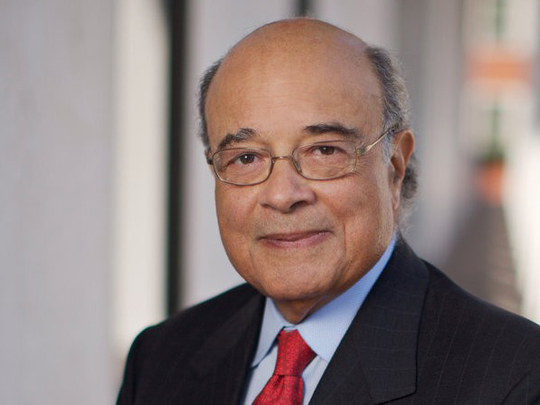
Dubai: No one knew him in his homeland until he died…Who was this Egyptian doctor that Bill Gates mourned?
Earlier this month, the world lost one of the greatest vaccine creators of our time. Dr. Adel Mahmoud saved the lives of countless children. https://t.co/FQFpS0U9Pb
— Bill Gates (@BillGates) June 21, 2018
Dr Adel Mahmoud, who passed away last week, was an infectious disease expert and had been credited for the development of many life-saving vaccines, the Wall street Journal reported.
Dr. Adel Mahmoud died on June 11 in Manhattan, New York, at age 76. He passed away at Mount Sinai St. Luke's Hospital following a brain hemorrhage, according to his wife, Dr. Sally Hodder.
As president of Merck Vaccines from 1998 until 2006, Mahmoud oversaw the creation and marketing of several vaccines that brought major advances in public health.
Vaccines
One of the vaccines he developed helps protect against gastroenteritis caused by Rotavirus infection, which causes diarrhea in children.
He also developed a vaccine for Shingles viral infection, which causes a painful rash, as well as another one for Human papillomavirus, which causes various warts on genitals and other parts and is also associated with the production of cervical cancer.
He further produced a combination vaccine against four diseases: measles, mumps, rubella and chickenpox.
The rotavirus and HPV vaccines were contentious subjects and might never have reached the market without Mahmoud's determination, Dr. Julie L. Gerberding told New York Times, an executive vice president at Merck & Co., and former head of the federal Centers for Disease Control and Prevention (CDC).
She described Dr Mahmoud as a "lifelong mentor."
Mahmoud championed those vaccines because he recognized their potential to save lives, she said.
Globally, cervical cancer and rotavirus infections kill hundreds of thousands of women and children every year.
Son, doctor, teacher
Adel Mahmoud was born in Cairo, and was the oldest of three children.
When he was 10, he ran to the pharmacy to get his sick father penicillin, and when he returned, his father had already died, his wife told the Wall Street Journal.
The loss forced him to grow up fast.
"I often wondered if his strength as a leader and his clear vision originated from being forced into those roles at an early age," his wife Hodder, spoke to the Wall Street Journal.
He received his medical degree from Cairo University in 1963, and in 1971, he obtained a doctorate from the London School of Hygiene and Tropical Medicine.
Dr. Mahmoud arrived in the U.S. in 1973 as a postdoctoral fellow at Case Western Reserve University.
He taught at Case Western for 26 years before becoming the president of Merck Vaccines. He left Merck in 2006 and began teaching at Princeton University in 2007.
One of Dr. Mahmoud’s greatest passions, his wife and friends said, was working with students. “He really enjoyed the success of others,” said Dr. Farrar, who taught with him at Princeton. “He didn’t give credit to himself, but liked to see others run past him.”
Last month, in a call to eliminate cervical cancer worldwide, the head of the World Health Organization called HPV vaccines "truly wonderful inventions" and said that all girls should be given them.
Dr. Anthony S. Fauci, director of the National Institute of Allergy and Infectious Diseases, spoke to New York Times about doctor Mahmoud: "He clearly had a knack for understanding the big picture," Fauci said.
"He was a 40,000-foot kind of guy, who could understand areas of science, research, policy and clinical medicine well beyond his own specific designated area of expertise."
Mahmoud also had "an amazingly likable personality," Fauci said. "Even though he was dead serious when advising you on important matters, he had this effervescent, bubbling personality," he added.
- With inputs from New York times and The Wall Street Journal












